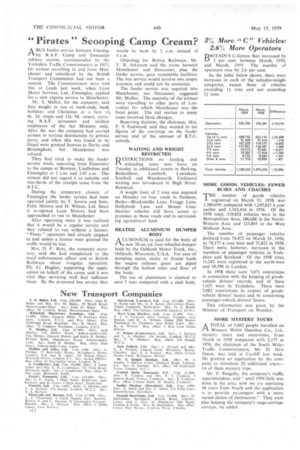" Pirates " Scooping Camp Cream?
Page 46

If you've noticed an error in this article please click here to report it so we can fix it.
ABUS feeder service between Finningley R.A.F. Camp and Doncaster railway station, recommended by the Yorkshire Traffic Commissioners in 1953, for airmen travelling to and from Manchester and subsidized by the British Transport Commission had not been a success. The Commissioners were told this at Leeds last week, when Leon Motor Services, Ltd., Finningley, applied for a new express service to Manchester.
Mr. S. Mellor, for the company, said they sought to run at week-ends, bank holidays and Christmas at a fare of, 85. 3d. single and 12s. 9d. return, carrying R.A.F. personnel and civilian employees of the Air Ministry only. After the war the company had carried airmen to various destinations by private party, and when this was found to be illegal were granted licences to Derby and Birmingham, but Manchester was refused.
They had tried to make the feeder service work, operating from Doncaster to the camps at Bawtrey, Lindholme and Finningley at 2 a.m. and 3.45 a.m. The airmen did not regard it as suitable and two-thirds of the receipts came from the B.T.C.
During the temporary closure of Finningley the feeder service had been operated jointly by T. Severn and Sons, Felix Motors and H. Wilson, Ltd. Since it re-opened Leon Motors had been approached to run to Manchester.
After operating twice it was realized that it would be a regular service and they refused to run without a licence. " Pirate" operators had already stepped in and unless a licence were granted the traffic would be lost.
Mrs. D. F. Rees, the company secretary. said she had complained to the local enforcement officer and to British Railways about irregular operation. Fit. Lt. Hughes, supporting the application on behalf of the camp, said it was vital that servicing staff had sufficient sleep. By the proposed bus service they would be back by 2 a.m. instead of 4 a.m.
Objecting for British Railways, Mr. T. B. Atkinson said' the trains between Manchester and Doncaster, plus the feeder service, gave reasonable facilities. The bus service would involve two empty journeys and could not be economic.
The feeder service was required into Manchester, not Doncaster, suggested Mr. Mellor. The majority of the -airmen were travelling to other parts of Lancashire for which Manchester was the focal point. The rail service in many cases involved three changes.
Reserving decision, the chairman, Maj.
F. S. Eastwood, said they wanted to see figures of the carryings on the feeder service and of the amount of B.T.C. sit bsidy.
WAITING AND WEIGHT RESTRICTED
RESTRICTIONS on loading and unloading came into force on Tuesday in additional streets in Barking, Beckenham, Lambeth, Lewisham, Southall and Wandsworth. Unilateral waiting was introduced in High Street, Banstead.
A weight limit of 2 tons was imposed on Monday on four roads in Denham, Bucks-Blacksmiths Lane, Froggy Lane, Hollybush Lane and Mount Line. Heavier vehicles still have 'access to premises in those roads and to surrounding agricultural land.
HEATED ALUMINIUM DUMPER BODY
ALUMINIUM is used for the body of a new 28-cu.-yd. four-wheeled dumper built by the Oshkosh Motor Truck, Inc., Oshkosh, Wisconsin, U.S.A. For ease of dumping moist, sticky or frozen loads the engine exhaust gases are piped through the hollow sides and floor of the body.
The use of aluminium is claimed to save 5 tons compared with a steel body.




















































































































